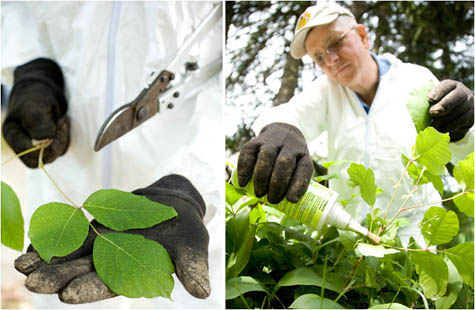 [Images: Poison ivy, resplendent in high-CO2 environments. Photos by Steve Legato for The New York Times].
[Images: Poison ivy, resplendent in high-CO2 environments. Photos by Steve Legato for The New York Times].One of the oft-repeated myths of the present day is that climate change cannot possibly be bad for the living environment; plants will simply thrive in the increased levels of atmospheric CO2. After all, some people call it pollution while others call it life, right?
Well, it turns out that at least one plant unfortunately does like all that carbon dioxide: poison ivy is not only thriving, it is growing more virulent.
The New York Times today reports that "Researchers at Duke University who studied the weed between 1999 and 2004 in a controlled forest area near Chapel Hill, N.C., where high levels of CO2 are pumped into test plots, found that poison ivy not only grew more vigorously, but also produced a more toxic form of urushiol, the resin that causes its rash."
First, let me briefly say that I've actually been to that forest. I once lived, and went to college, in the area, and I had friends who'd developed fascinating conspiracy theories about all those strange devices pumping something – some kind of invisible gas – into the forest... It was all very X-Files.
Second, the article goes on to interview a local horticulturist who now makes a living killing poison ivy. However, he quietly expresses hope that Americans will someday "discover some use for the plant," referring to poison ivy as a kind of overlooked decorative resource. "In China and Japan," he says, "they made lacquer out of their resin plants, so they understand and value it... Whereas we just see it as that darn weed over there."
Of course, it's interesting to project a direct relationship here between the amount of lacquered furniture being produced in the United States and the intensity of global climate change – that as the latter goes up, so does the former – but such speculation would miss a more interesting point, which is that climate change will not only alter the atmospheric composition of the planet, it will alter the chemical nature of the life that's able to thrive on it.
No comments:
Post a Comment